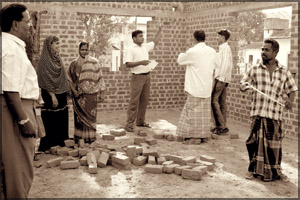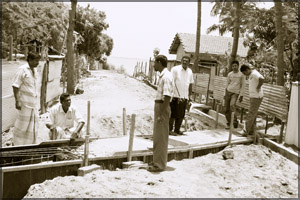|
After the tsunami:
The changing place of women
by Sharni JAYAWARDENA
Disasters destroy and disrupt. Yet, a disaster *can *recreate and
reconstruct. It can bring opportunities for people to rebuild their
lives in ways that reconfigure social relationships. It can, for
example, empower women. The December 2004 tsunami was no exception.
|

A house under construction |
T. Rufia from Kalmunai, a 32-year-old mother of two girls, faced the
challenge of the tsunami single-handedly, with her husband in the safer
confines of a prison. Her house collapsed to the ground, but she and her
children were unharmed. When the government gave her 250,000 rupees to
build a new home, she knew it would not be enough, but focused on
establishing a firm foundation for the family she is responsible for.
Even two years after the tsunami, tens of thousands of families in
Sri Lanka were living in partially-built houses because the government
grant they received fell short. This was when several agencies came
forward to provide 'top-up' grants to help people restart from where
they were forced to stop.
In the Ampara district, UN-HABITAT collaborated with Norwegian
People's Aid (NPA) and the Solidar INGO Consortium to help 475 families
complete their homes, rebuild damaged community infrastructure, and
improve livelihoods.
Rebuilding Community Infrastructure and Shelter (RCIS) is a project
that uses the key mechanisms of Community Development Councils (CDCs)
and Community Action Planning (CAP) to ensure that people are well
represented and active participants in their own development. CDCs
identify and prioritize critical issues, plan action, implement
activities and monitor work. In fact, money for all construction,
capacity building and livelihood development activities is channelled
through them.
Setting up the CDCs, however, is a complicated process. But, as Rufia
points out, it is also an empowering one, both for the community and for
individuals: "First, we needed to register the CDC with the local
authorities. As its Secretary, I went with a few other office bearers to
the Divisional Secretary's office to get this done. I then took on the
responsibility of opening a bank account for the CDC. It was not an easy
task because I had not done this before. Besides, no one took us
seriously.
|

Workers at a site |
Today it's a different story. They treat us with respect. We manage
millions of rupees through this account." In many areas of the country,
socially and culturally imposed restrictions to women's mobility and
social contact limit their access to information and undermine their
confidence. Rufia is happy that she can now deal easily with banks and
other institutions. After a year of being the CDC Secretary, she stepped
down to let another member take up her position: "This is the policy of
our CDC. When we are office bearers, we gain a lot of experience and we
feel we should also give others a chance." With the 350,000 rupees she
received, in instalments, from the RCIS project, Rufia completed her
house to a 'secure and habitable' standard. This essentially means that
her home has at least one lockable room and enough light and ventilation
for healthy and comfortable living.
The image of the woman and child as victims of disasters is one that
the media perpetuates. It is true that women are disproportionately
affected by natural disasters because of their secondary status in
society. But it is equally true that women are a vital part of disaster
mitigation and response, often transcending their traditional gender
roles when a disaster strikes. Rufia is one of many such examples.
What's needed to sustain these gains is recognition.
Gunaseeli is the President of the Kundumadu CDC. She received only
100,000 rupees of the government allocation and was so much in debt that
she even had to go into hiding from impatient creditors. To add to her
problems, the house she managed to build had to be brought down because
of its poor quality: "After the tsunami, everyone became a mason, and
people had to go along with it. But things have changed now. We received
technical advice from the beginning to the end of construction. Not just
that, being a member of a CDC means that we can negotiate for better
rates with construction workers who are good at their work and we can
buy construction materials in bulk." The CDCs reserve 2.5% of the
housing allocations for community development work. The project also
provides 8,000 rupees for each household for infrastructure development.
The CDC, through an entirely participatory process, decides how to put
this money into good use. In Kundumadu, a multi-purpose building, on
land donated by Gunaseeli, will serve as a pre-school and community
centre. Building is still underway, but the CDC has already drawn up a
maintenance and sustainability plan.Households located close to each
other form 'cluster groups' so that more people are represented in the
CDC and are better informed about what's going on. K. Gunaseelan, the
project's Assistant District Manager for Potuvil, sees even more
advantages: "Cluster groups help make things happen more democratically
within the community. They also ensure that group members follow the
construction schedules set by the CDC and lend a hand to those who lag
behind." More women than men tend to participate in the cluster groups.
They gain confidence to contribute more fully at larger meetings.
Cluster groups have become a means by which women get involved in
project activities and are elected to influential positions in the CDC.
|

Discussing with community |
Kadija Umma, a mother of three, took almost four years to build her
new home: "I was in debt, but used every cent of the 200,000 rupees I
got from the government to build one room and part of the roof. When I
got the money from UN-HABITAT, I got some good technical advice as well.
I decided not to use asbestos sheeting for the roof and made my windows
larger. So I've built a solid house that is good to live in. And the CDC
was always there to help out".
Many post-disaster houses, often described as "donor-driven" are
built to a prototype design and located a considerable distance from
people's traditional homes and livelihoods. A considerable number of
these houses remain unoccupied. Conversely, Kadija Umma feels a sense of
ownership of the home she has finally completed. She values the fact
that her home is "owner-driven", that it incorporates her basic
requirements, including some improvements suggested by the technical
officers: "I was very much part of the process of building my home. Now
that I've built it, I can think of other things." Kadija Umma plans to
expand her home when she makes the money to do it.
Soon after the tsunami struck, Kadija Umma was compelled to sell her
jewellery so she could meet her family's urgent needs. Women are usually
the first to lose their assets in times of crisis; when it is time to
revive their economic activities, they have nothing to invest. RCIS has
begun supporting people, particularly those who are the poorest, to
rebuild their livelihoods by developing their skills and providing small
'start-up' grants. UN-HABITAT is linking the CDCs with other agencies so
that people can benefit from a wide range of expertise and assistance.
A. H. Mohamed Jezeer, the Training and Livelihoods Coordinator of the
project, points out that a new and well-built house alone does not
ensure a family's well being.
People need a dependable source of income: "Better livelihoods mean
improved assets which, in turn, lead to reduced poverty and better
resilience. This is what we want the RCIS livelihood initiatives to
achieve."
V. Kanthi from Kundumadu in Potuvil has just completed her house and
the project is helping her set up a small dairy-based enterprise. She is
anxious to improve her income because she must bring up five children on
her own. Ravia Amma learnt new home gardening techniques from her
husband who was recently trained on the subject. She will use the garden
produce to feed her family as well as to make some extra money. T. Rufia
is intent on improving the tailoring business she began when she was
donated a sewing machine after the tsunami. But what she really wants is
to become a teacher, because she has seen the difference that knowledge
can make: "It will be education first and employment next for my two
daughters," says Rufia, "then they can think about marriage". |
